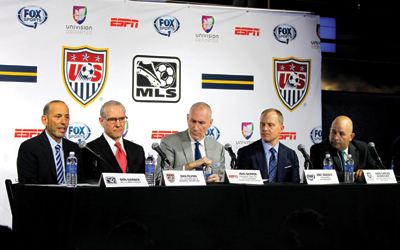Back in my high school soccer days, immediately after my team scored a goal, our coach would implore us to work harder the next five minutes, preaching that getting caught up in a celebration was a great way to let your guard down. Likewise, the massive new Major League Soccer/U.S. Soccer TV deal is reason to celebrate for many parties, to be sure — and then it’s time for all of them to get to work.
First: the very warranted victory lap. It is not hyperbole to say this is a watershed moment for MLS, U.S. Soccer and soccer fans in America. Sports properties are measured by rights fees, and MLS just quintupled its take. (The reported eight-year, $720 million deal with ESPN, Fox and Univision also includes U.S. Soccer, which could enjoy a boost if it defies the odds and shows well in this summer’s World Cup despite a brutal group.)
Having worked in or around pro soccer for more than 20 years, I have seen the gradual explosion of the sport happen before my eyes. ESPN says 41 percent of all Americans are now pro soccer fans. Several U.S. networks are each spending tens of millions of dollars annually on properties from the UEFA Champions League on Fox to Spain’s La Liga on beIN Sport to the English Premier League, which enjoyed record U.S. ratings on NBC’s networks this season.
And while the international game continues to prosper here, so too does MLS. Ancient history is talk of the league’s viability. Rather, its footprint is growing, and more big-name players are coming in their prime. The product is infinitely better than it has ever been.
 |
|
The eight-year, $720M deal with ESPN, Fox and Univision represents a milestone for MLS, U.S. Soccer.
Photo by: USA TODAY SPORTS IMAGES
|
Having been to matches all over the world, I was absolutely blown away by the atmosphere on my first trip to a Sounders game in Seattle last year. Turn on a game from there or somewhere like rowdy Portland or Kansas City and you’ll see what I mean.
And the (soccer) world is noticing. In the stadium at last year’s European Champions League final, I was shocked at the level of MLS knowledge by my hosts from governing body UEFA. This February, on another swing through Europe, fans from England to Belgium knew an impressive amount about MLS over pregame pints in pubs.
Now, to be sure, these TV deals are not an outright coronation of MLS’s arrival. TV ratings are still very modest, and detractors of the league’s quality of play remain.
This huge TV money influx for MLS is also about being in the right place at the right time, the league being a beneficiary as sports networks not only battle each other, but also all the other places fans can access sports content — ranging from YouTube to their video game consoles.
So, going back to my initial analogy, the goal has been scored, and now comes the next five minutes. It’s time for everyone to justify these huge deals: MLS for earning them, and the networks for paying for them. Here are a few thoughts:
■ FOR BOTH PARTIES: Stay the course.
The new locked-in times for the three national matches are a huge step. Play the long game: Don’t panic if the NFL steamrolls your ratings in the fall. My young kids already know like clockwork that there are Premier League games on at certain times on Saturdays and Sundays. That’s a habit that sticks.
I’d also consider adding a second game to each time period and regionalizing, though the league has long wanted to keep as many games on Saturdays as it can for attendance reasons. But MLS is in enough markets now that many fans may just watch their teams, and that’s fine. Remember: MLB’s national regular-season ratings have little to do with the health of that league. Just look to the significant local ratings to see that baseball is still huge.
■ FOR MLS: It’s on you to deliver a constantly and quickly improving product.
Keep investing in players and soccer-specific venues that create atmospheres that make for great TV. And don’t be complacent. Getting Manchester City and the New York Yankees to back a new team in New York is great, but we’ve already seen an MLS team backed by a massive club (Chivas of Mexico) founder.
A lot of the heavy lifting has to come from the networks, too. They need to justify the huge rights fee increase for a league still looking for ratings growth. Now they have a financial responsibility to help grow the league. I think it will go down as a great bet, but it will take work on their part.
■ FOR NETWORKS: Production-wise, the bar has never been higher.
NBC’s coverage of the Premier League is nothing short of glorious, Fox sends its own talent to big matches in Europe, and ESPN is to World Cup coverage what David Beckham was to free kicks. MLS viewers will expect the same quality.
The networks have to create great shoulder programming; one game per week is not enough to grow the property. MLS needs to be woven into other programming on the partner networks, as well. Successful upstart Fox Sports 1 and the UFC have absolutely written the book on this, as the dynamic Dana White and his stars are seemingly everywhere across the network’s programming.
These are eight-year deals, so patience must be the order of the day. As ESPN’s savvy chief John Skipper put it, “It’s a futures deal.” But right now, the sport has unparalleled momentum, which will grow hotter post-World Cup. Soccer in America has scored and scored big. Now it’s time to make sure it doesn’t give one back.
Ben Grossman (bgrossman74@hotmail.com) is a Bay Area-based media consultant.
IT’S YOUR TURN TO SPEAK OUT
Guest columns may be sent to Street & Smith’s SportsBusiness Journal, 120 W. Morehead St., Suite 310, Charlotte, NC 28202. For further information, please contact Betty Gomes at (704) 973-1439 or bgomes@sportsbusinessjournal.com.





